How to Breed Gerbils
With an eye to the future would be my advice.
If you are new to gerbils or at least new to breeding them – then this article is full of useful information for before you get started.
The biology of breeding gerbils is quite easy in itself – as with most mammals – however, it doesn’t follow the same process as other common small pets you may have had before.
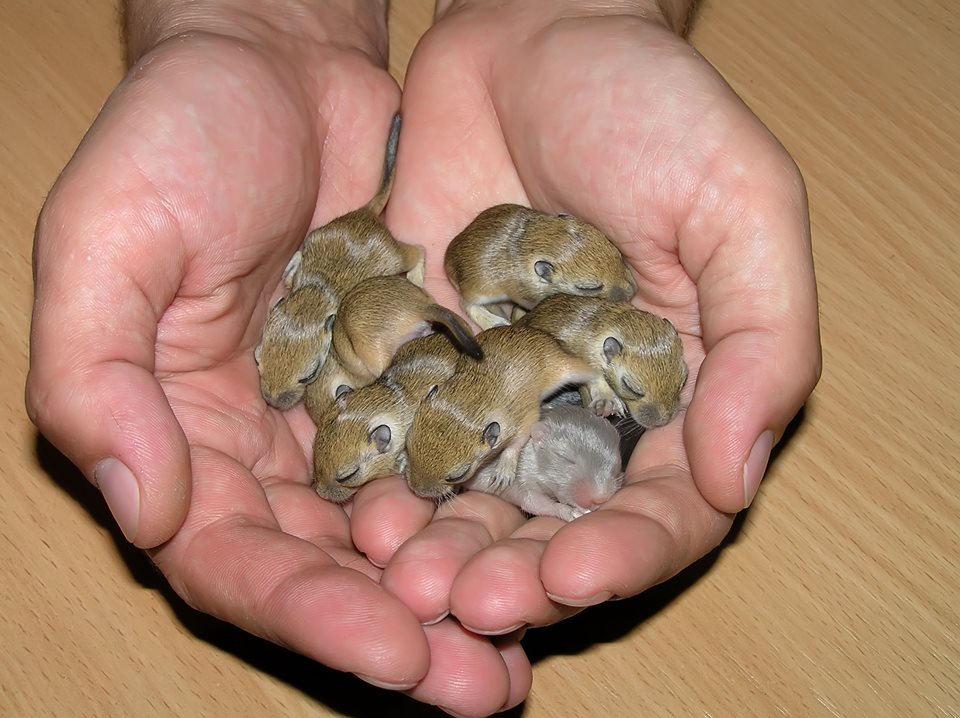
Breeding gerbils can also mean you end up with three or even four times as many tanks as you started with – as they are best homed in specific family groups only and at specific ages.
Below are some of the set-ups and reasons for breeding gerbils and their most likely outcomes – giving you a heads up into the breeding world before you get started.
I just want one litter:
Gerbils are designed biologically to have two litters in a row (to make the most of the breeding season). Female gerbils can and often do get pregnant on the same day they give birth – usually within just a few hours.
Unlike hamsters, male and female gerbils like to live with each other throughout the whole process, with the male gerbil staying in with the female for the first litter and helping to raise it.
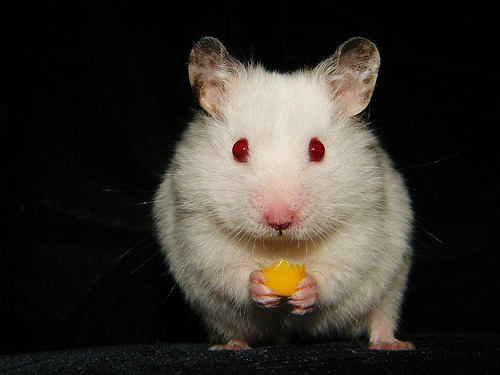

It won’t take long:
If you are going to breed gerbils – you will probably need to set aside around 3-4 months minimum (if all goes well).
You will need at least a week to Split Tank the happy couple together, then at least 3 weeks until she has the first litter and then around 4 weeks more before the mum doesn’t need his help any more. Unlike chinchillas – they don’t just meet in the night and go their separate ways.
I can use my existing gerbils:
Absolutely – and this is what most breeders do – but only if they are or can be single. If you take a male or female out of an existing clan with the hopes of returning them to that original clan afterwards – you may be out of luck.
With each gerbil having to be apart from their original clan for around 3-4 months – they will be total strangers. You would have to Split Tank them back together for a week or more before you could be sure they are friends again – a total of nearly 5 months could pass with the leftover gerbil being on their own.
And if they came from a trio or more – this would almost certainly be out of the question. It wouldn’t even be recommended that you try it.
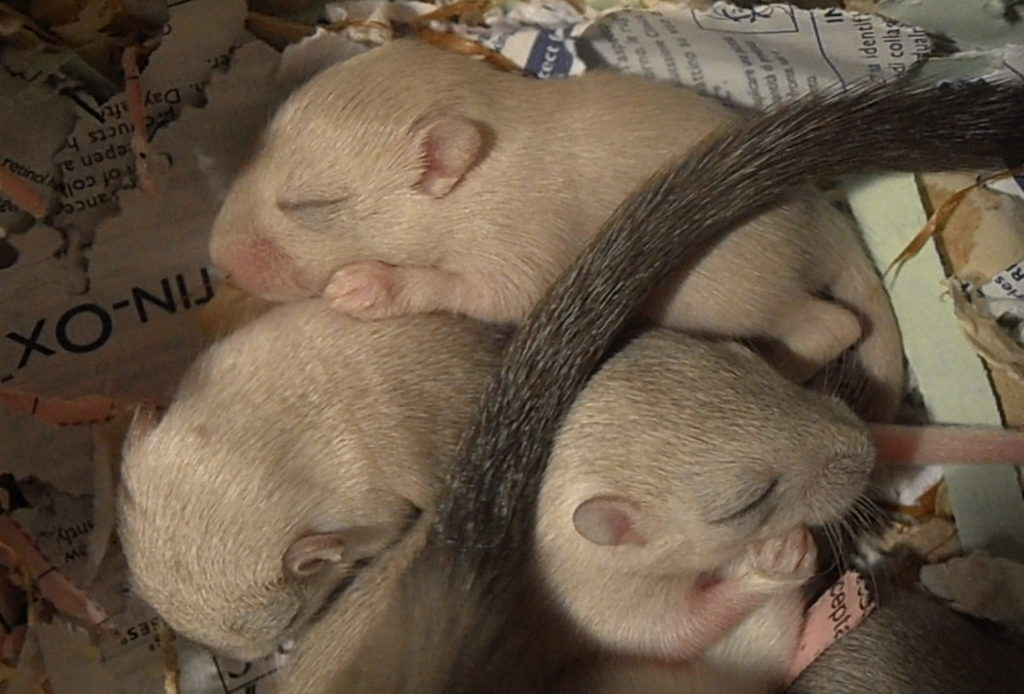
I will have two females and one male:
This is really not advised as there is a chance that not only will the females fight with each other once pregnant, but they may also kill or eat each others pups once born. Unlike guinea pigs – they don’t tolerate communal nurseries.
You could have the same male get both your females pregnant of course – but you would be best to remove one of the females from the trio before anyone gave birth. This would of course mean that she would have to raise her pups all on her own, without the help of a mate and that she wouldn’t have a second litter straight after.
How about 2 males and one female?
Breeding groups of any kind usually do not work out in normal gerbil tanks and enclosures. It would be very likely that the two males would fight over the female, either before the gave birth or after – I have heard of both. They may even kill the pups – but this is quite rare.
If you tried this, you would most likely have to take out one of the males anyway at some point (preferably before anyone got hurt) so you may as well have not tried it in the first place?
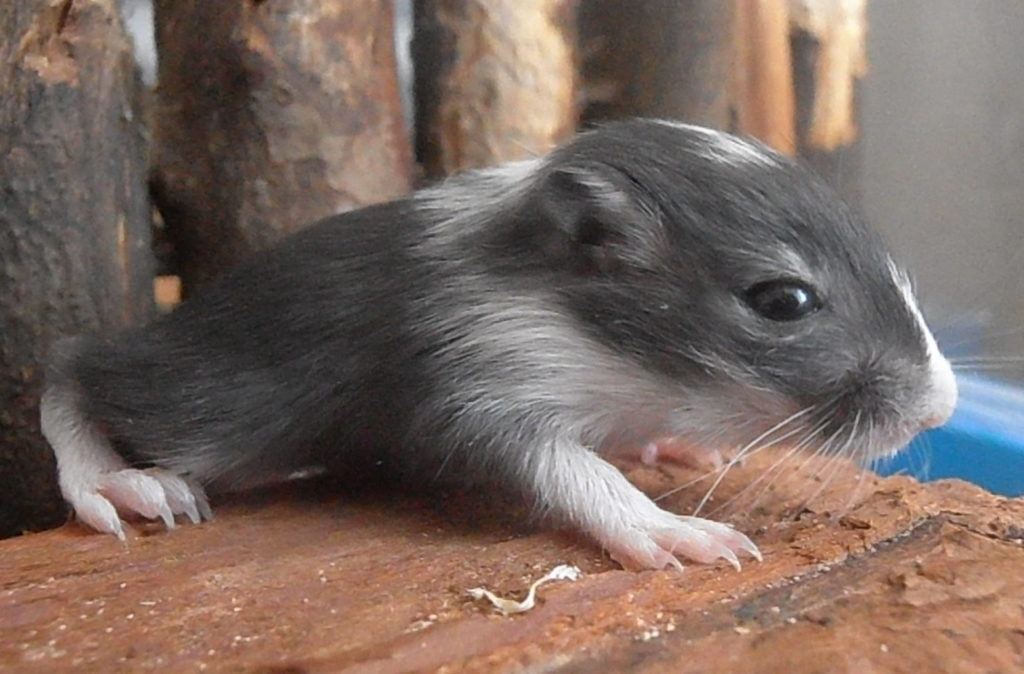
I won’t keep any pups:
Now this is just silly talk – who wouldn’t want to keep one or more of these adorable little gerbabies?
Usually in the gerbil world, you leave at least one female pup in with the mum and one or more male pups in with the dad his new tank.
This doubles your tank numbers overnight of course, and if you can’t home the pups before they are 12 weeks (reaching maturity), you may need a third or fourth tank to split up the sexes of the pups you aren’t keeping.
I’ll leave the pups in with the parents:
Leaving pups in with dad is a great idea, and many a father and son clan is very stable. Once he has his clan settled, he will be the Boss and everyone will be happy. Even if you take out a pup or so from the clan, it will probably remain stable.
Females however, are a different story. If you keep more than one female pup in with mum, there could be trouble down the line.
Pairs of females are usually stable, but trios or above can declan at any point so always try to pair up female pups to home in twos only. This isn’t always possible I know, but unlike female mice, you can’t just chop and change these groups around to suit your breeding desires.
Leaving pups in with both mum and dad would be a disaster. Not only would there be squabbling I would imagine and the loss of further pups, but after 12 weeks, there would be the chance of mating within the family.
Just like all our pets – they don’t know or care that they are related, they will breed with whoever is receptive – which is no good for the health of the line and of the species.
I’ll leave the parents together forever – and just take out the pups:
Some people are quite happy to leave a male and female pair together their whole life.
However, gerbils don’t breed seasonally like degus mainly do, they breed all the time, all year, all their life – this means that the female will be put under great strain this entire time.
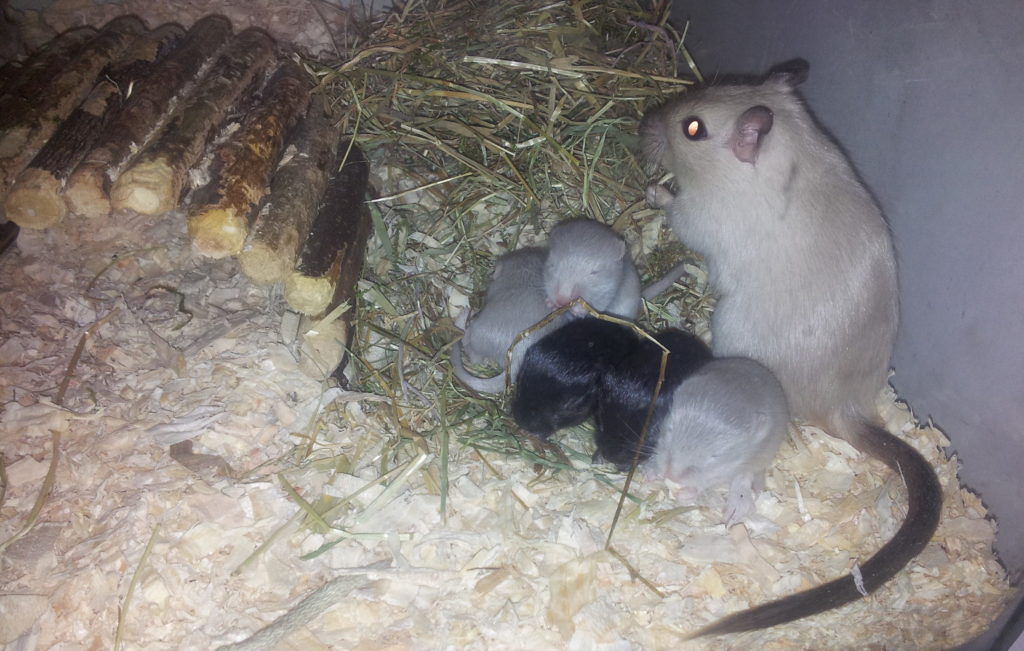
Pregnancy and lactation are extremely energy-intensive and this can take its toll on a female over time – she would need a really good diet to cope with this and will possibly be churning out a litter a month as she keeps coming into heat after every birth.
Just as importantly – for this to work pups-wise – you will need to constantly find them homes or increase your tank supply, as once gerbil pups are over 12 weeks of age, they don’t mix together very well with new pups.
For example: taking out a pair of 3 month old females from the family clan, will mean that is them done. You can’t add more pups (or adults) to them once they have been moved away from the clan – even if they are siblings.
Therefore, until you can home them, you have to keep them separate from everyone else. It is best to plan ahead with females to try to match them up – otherwise when your next litter reaches 12 weeks a month later, you will need to put any new females from that lot in a new tank too – and so it will continue.
Having more than one breeding pair of adults will help here as you can match up odd gerbils into pairs. You shouldn’t really take out a single gerbil from the family clan until they have a partner of the same sex (but not necessarily of the same age) as otherwise they will need to be Split together over time. So, by having multiple litters being produced, their ages overlap and it is easier to make suitable pairs for homing.
However, as you have probably guessed it, if you are having two pairs producing a litter every month, each with an average of 5 pups per litter, you would need to find a LOT of homes.
It won’t be an easy task to find homes for 60 gerbils every 6 months – especially if you haven’t got your genetics right, and all the gerbils are the same colour…
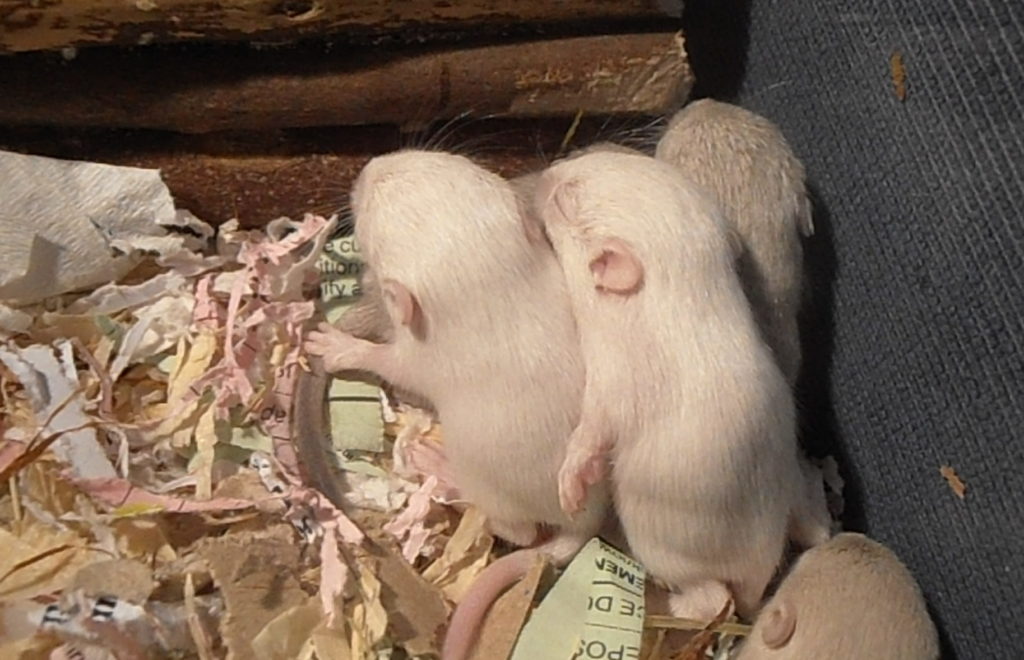
What’s the oldest age a female should be bred for the first time? I have a lovely female, 8 months old, who I would like to breed. Due to my current situation I can’t breed for a least a few months, maybe a year. I’m thinking she’ll probably be too old to be responsibly bred by then though.
Hello Susanna.
Ideally females under 18 months are best for breeding as everything in their reproductive system is in its prime and they are in the best of health as well. This makes for the very best chances for the mother and her two litters in terms of a good start in life for them and for the mother the best chance of remaining healthy afterwards.
There is no ‘by the first time’ rules for gerbils – gerbils should be fertile and able to have pups throughout their adult* lives (3-18 months) without issue. *After 2 years I personally assume them to be seniors and make lifestyle changes and decisions based on that.
Females CAN stay fertile way into their 3s but this doesn’t mean that they can breed successfully, raise the pups or recover a good life for themselves afterwards, so after the age of 2 I would certainly start to consider another female so that your current gerb can enjoy just being a gerbil, and new younger female can take on the challenge of motherhood.
Also, is your female alone already – as I would certainly consider getting her a friend to fill the passing time if you think it will be more of the year – but if it will be in the next few months of course she can keep her own daughter for company.
Do let us know what you decide on and how it goes…
Good luck,
RodentZone
Thanks for the very helpful answer.
She lives with her sister, who has a lovely temperament but isn’t breeding quality. I understand that she wouldn’t be able to go back with her sister after being bred, so that’s another thing to consider. This pair get on so well for females it would really be a shame to split them up.
To be honest, I think it’s unlikely I will be able to breed this female, but I’m sure there will be other lovely gerbils available when the time is right.
Thanks again,
Susanna
So, i’m a little slow so i’m confused on when I should take the father out of the tank. Also since I need to separate my two males, can I ever put them back in the cage with the father and his sons? Also about the sons and father things, do I put the males with the males and females with females? Sorry for so many questions but I want to make sure everything is right when I breed my gerbils.
Hello Caitlin.
My answers in order:
If you are looking for only one litter – then take the male out in just under three weeks from them being put together – then he won’t be able to father a second litter. However, if you are going to use the traditional set up and leave him in for the second litter, then you take him out three weeks after the birth of the first litter.
Gerbils can be really frindly on the one hand and really unhelpful on the other. The general rule is that an established clan of gerbils (two or more adult (over 10 weeks) gerbils who have been living together exclusively for more than a week or so) don’t mix well with any other gerbils – especially not more than one. However, some people do say that sometimes gerbils who are closely related do often split together quite well – at least in the short term, but I have never tried it as I don’t like to take risks with my little ones – especialy as gerbils usually have very strict clan rules.
So, personally, if you are keeping some pups with the dad, I wouldn’t risk putting the other male in the mix – especially as the father smells all of a female and has probably been away from the other adult male for several weeks. However, you could split together that single other male with a male pup for a new friend?
Most people keep all the males with the dad (adding the second litter males to the dad and first litter males when they are around 4 weeks old) as larger groups of males (in a large enough environment) can get on well for the long term. Leave just one or two females with the mother – as large clans of females don’t usually work long term. So you either: keep all females with the mum but be prepared to split them up if you see ANY early signs of a declan – or (my preferred option) take out pairs of female pups to home elsewhere leaving either a single female with the mum (or a pair depending on the maths of course). Certainly don’t leave the mum without a daughter.
Any more questions – do ask away – or join the gerbil forum and find a mentor…
Good luck,
RodentZone
Hi,
I’m not sure yet if my gerbil is pregnant… I tried to split what I thought was 2 boys together and instantly separated them when their behaviour proved otherwise.
After reading this article I now think I should have left them together for 3 weeks but too late now… I panicked thinking I didnt want pups.
Now I’m really hoping I do get a litter but definitely don’t want a second, and my plan if I do get pups is boy/s with dad and girl/s with mum, but what if I end up with all boys or all girls?!
Then I would still end up with a lone gerbil… Could I put the dad back in, would I need to split tank them all together, or can he not go back in once she has pupped, as they have now been apart for the 3 weeks since they met?
Sorry for all the questions!
It is always a difficult one when gerbils are involved.
If they have been apart that long – then I would wait and see if she has pups – otherwise putting him in indefinitely now will certainly give you two sets of pups. And this of course is another reason why having two sets of pups is beneficial too – not only can the male help raise the pups, but then there are plenty of each sex to choose from to keep or home than if the litters are small or all same sex (which I have had several times). However, of course, you could end up with over 12 pups if they happen to have 2 large litters.
However, putting in after she has had them might be risky – it could go either way depending on how calm are relaxed the mother is with the new pups.
I never really suggest breeding gerbils as a one off – especially if they were brought in error and together as it is very likely that the mother and father will be related, possibly even brother and sister. However, if you are sure they aren’t related and were serious about helping them in raising pups, I would always recommend two litters as two consecutive litters offers benefits to both you and the gerbils, and the mother will be retired after that second litter. So if she hasn’t had a litter in the next 10 days, she most likely didn’t take and so you could re-split them together and start over with them as a couple.
Be ready for extra tanks though – breeding gerbils multiplies your tanks too…
Hello,
Thank you for the great information. It is very helpful
My daughter picked out what we were told were two male gerbils. A few weeks later we have a litter of 5. She is hoping to keep a pair or trio of males. After lots of reading, I decided to leave the male in with her so she would have his help. The babies are four females and one male. I would like to separate the dad and baby male so she doesn’t have a third litter. I would like to rehome one pair of the females.
My questions:
-Can I leave two females with mom while she has the second litter? (I’m hoping she will have another female to be able to be able to pair them. I don’t want to home any as singles.)
-If she has another male in the second litter, after he weens will we be able to put him with the bonded father and son, or will that be hard to introduce that third?
Thank you
Yes to both Christy.
You can certainly leave two young females in with the mum to help with the second litter – we have done this ourelves many times. As long as the mum doesn’t get grumpy (and if she does just take out both young females together to maintain the pair) and they have plenty to occupy them and space to sleep outside of the maternal nest – they should be fine.
And pups-wise – it is usually very simple to add extra males in with the dad and any first pups – dads are very understanding. If you can tell them apart, put in ALL the male pups at the same time – and any femal pups to home too (rather than just your single one). That way the dad is ‘overwhelmed’ with his offspring all at once rather than focussing on just the one little one – the reason he will focus on it is because it will smell of the female and the male will be a bit hormone-driven (and can sometimes mount the pups in confusion) therefore adding multiple pups means he doesn’t just obsess on one. Also, after the initial shock of it all for him, you can start to pluck out all the pups for homing leaving him with the remaining ‘keepers’.
You can just just put the one in and distract the dad with sandbaths, mealworms and loads of hay or straw if you would feel better doing that (or all the pups are the same colour and you can’t tell them apart!). Hw should be fine either way. Dads are great.
Hello
I’m so glad I found this page
I adopted 2 male gerbils last year but unfortunately one suffered a major stroke last month and we had to have him put down 🙁
After much research we decided on 2 male pups for the existing male who is around 1.5/2 years – and were sold 2 boys of 8-10 weeks at the pet shop
I waited 2 weeks to introduce after extensive research and they took to each other beautifully straight away :)))
Then came the problems….. four days I noticed mounting- so I frantically searched what it was as my rat boys all mount each other – but to cut a long story short they turned out to be girls ( after 3 people sexing them as males at the shop!!! )
Anyway I separated the male back in his own which broke my heart as he was so happy with the girls and 21 days later I made up a separate cage for the girls to be split as I had no idea if one / both were pregnant and read they must be separated if they are pregnant
Sure enough day 25 evening/ morning one gave birth to 3 pups – the other as to date has not give birth
They are now in 3 separate cages – all next to each other but it’s so upsetting for the young female now alone and my darling muffy (boy) who lost his brother then his new friends
What is the best course of action please?
Obviously I will try to put boys with dad – not sure in sex only 2 days old currently-
Can the sisters go back together ( with or without pups) or will the one alone be that way forever? I hope not
I will keep them all regardless as a small litter
The sisters are only Approximately 4 months themselves
Thank you so much in advance
Oh dear – looks like pet shop staff strike again!!!!
So, as you now have two lonely gerbils and an onverworked gerbil – you are right to think of your options.
First options as you said is always you can put in pups with the dad even if he hasn’t met them before. Once they are 4 weeks old, they will be fine, and you can give him as many as you want – father-son groups are very stable in general. We have done this plenty of times – up to 5 pups if you have the space.
The females are a bit more hit and miss.
Safest plan would be to split one of the female pups to the single female when it is 5/6 weeks old as this should work reasonably well and the mother can keep a female pup or two too. Still leaves you with three tanks though – unless you home this female pair or the male group?
Less safe: You CAN try to reintroduce the two original females after all the pups have gone, but this assumes you are homing them all?
More risky: Two females that haven’t fought should still have a 50/50 chance in a split intro – however we ourselves never actually managed to split together a previous mother gerbil with any other unknown females – no matter how long in time between weaning and new friend. We however, never tried to reunite an existing pair (as we leave mums with pups) – so have no idea what the odds would be for that?
Much riskier: Depending on the mother gerbil, she MAY accept the other female back with one of her VERY YOUNG pups if they were really good friends/sisters in the first place (females can on occassion both raise litters in the same enclosure), but this is super risky from our point of view – especially as they have now been apart so long, and personally we wouldn’t try it ourselves because you just can’t trust a mother anything to behave normally. Those pesky hormones.
I’m sure that doesn’t really help – and I would certainly suggest you getting other people’s opinions if they have ever tried this themselves as their facts will be more realistic rather than other people guesses.
So again, safest for the gerbils is defo a pup or two to each separate adult (as very young pups aren’t a problem in splits) – so three separate tanks (basically 3 new clans).
I’ve been doing research on gerbil genetics and breeding because I feel like gerbils would be a great way to begin to understand coat coloration and patterns. However, there is something I don’t understand. How do you breed gerbils without them getting lonely? After you take a male and a female out of their clan to breed them, then what? It says that you should leave a pup with the father and mother, but what happens when you rebreed? Can you just put the father back with his son after smelling like female? Can the mother go back with her daughter to help her raise the new pups? The only thought I had to combat this is have a split tank with the females on one side and the males on the other always-so they are always used to the smell, put the male and female together in a new tank just long enough fro breeding, and then put them back with their clan? It is hard to explain what I mean but I just don’t understand how to keep rebreeding a pair without keeping them together constantly.
A second, smaller problem is that I don’t know how to find breeders. I live in Michigan, USA and I’ve googled “gerbil breeders near me” to only get results in a different state a few hours away. There are of course pet stores, but I want someone that knows the gerbils age and their basic genetics. I don’t know where to look!
Kind regards,
Blayz
What great questions Blayz – and yes, gerbil genetics is a great place to start learning.
The key to the answer is in the clans – and a bit of decent husbandry. The males and females are the clan to start, then the family groups are the clans afterwards – you don’t just swap them back and forth willy nilly – and you don’t keep breeding the same females. Two or three litters in such a short life is surely enough for any animal?
So, pair up a single male and female (and assume the ywill never go back together with any currenlt clan mates) then leave together for 2 (or 3) litters in a row. As you say, a few days before your final litter is due, you take out the male and any remaining pups you don’t want to leave with the mum and that is your two new clans. You can add any newly weaned pups from the last litter in with the dad and other pups at aeound the 5 week mark, and leave any more females you want with the mother indefinitely (if you are looking to home any remaining females do separate them off before 8 weeks to allow the mother clan to settle).
If you are planning to breed any of the pups or the dad again at a later date, make sure you have created a clan or clans that will allow you to permanently remove that individual so they can start their own new clan with their offspring without leaving another gerbil alone unecessarily.
It just keeps the flow moving forwards rather than wearing out one single female.
Answers to Part 2 coming shortly…
Hello again.
Yes, finding a local breeder in the US is a bit trickier – but certainly contact the American Gerbil Society (AGS) as they should have a lost of contacts that could be in your area for starters.
Also, looking at rodent shows in main locations and big cities can help you get something from farther afield. Breeders travel cross country to and from these locations and possibly you could meet them on route from A to B or vice versa. That way – you may be able to get specific gerbil with specific genetics from a breeder who lives 10 states away at your local service station.
Or have another breeder ship their gerbils from the show itself to closer to your place on the way home themselves – like a personalised courier.
Always worth considering both these options for sure before using an unknown courier.
Hope you have lucky search for yours – and do stay in touch!